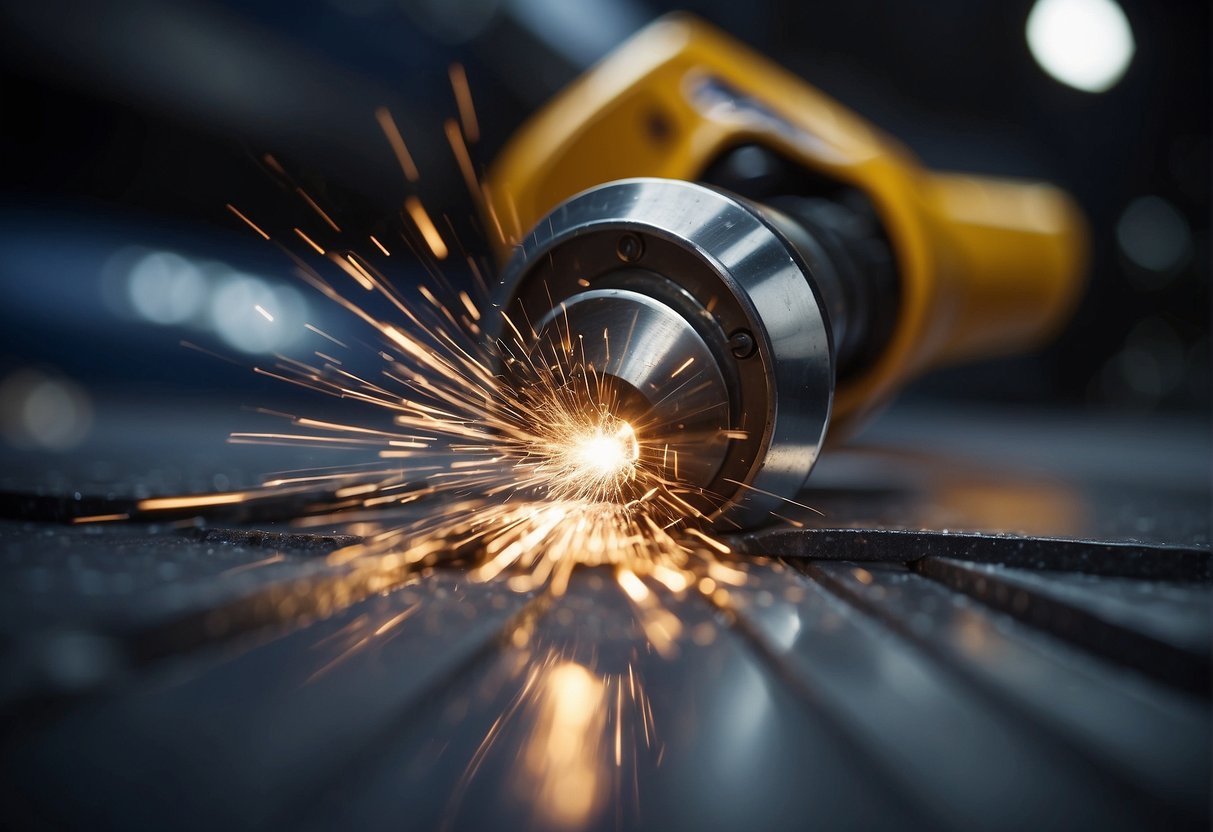When it comes to drilling, the type of drill bit you use is crucial to the success of the project. Two popular types of drill bits are HSS and cobalt. HSS stands for high-speed steel, while cobalt drill bits are made from a steel alloy mixed with cobalt.
Both HSS and cobalt drill bits have their own unique characteristics that make them suitable for certain applications. Understanding the differences between these two types of drill bits can help you choose the right one for your project. In this article, I will compare HSS and cobalt drill bits, discussing their strengths and weaknesses, and provide some tips on how to maintain and sharpen them.
Key Takeaways
- HSS and cobalt drill bits are both popular options for drilling, but they have different characteristics that make them suitable for different applications.
- HSS drill bits are more affordable and work well for drilling softer materials, while cobalt drill bits are more expensive but can handle harder materials and higher temperatures.
- Proper maintenance and sharpening are important for both types of drill bits to ensure optimal performance and longevity.
Understanding Drill Bit Materials
As a professional in the field of drilling, I have come across various types of drill bits. Two of the most commonly used drill bits are High-Speed Steel (HSS) and Cobalt. Understanding the composition, heat resistance, and hardness factors of these drill bits is essential for selecting the right drill bit for the job.
Composition of HSS and Cobalt Drill Bits
HSS drill bits are made of a combination of carbon steel and high-speed steel, which is an alloy of tungsten, carbon, chrome, vanadium, and sometimes other elements. Cobalt drill bits, on the other hand, are made of a combination of cobalt and steel. The cobalt content in cobalt drill bits can range from 5% to 8% depending on the manufacturer.
The higher percentage of cobalt in the drill bit, the harder and more heat-resistant it is. However, cobalt drill bits are more brittle than HSS drill bits and can break more easily if not used properly.
Heat Resistance and Hardness Factors
HSS drill bits are a good choice for drilling into softer materials such as wood, plastics, and aluminum. They are also less expensive than cobalt drill bits. However, HSS drill bits tend to lose their hardness and become dull faster when drilling into harder materials such as stainless steel.
Cobalt drill bits have a higher melting point than HSS drill bits, making them more heat-resistant. They are a better choice for drilling into harder materials such as stainless steel, cast iron, and titanium. Cobalt drill bits are also more durable and can last longer than HSS drill bits.
In summary, when selecting a drill bit, it is important to consider the material being drilled and the job requirements. HSS drill bits are a good choice for softer materials, while cobalt drill bits are better for harder materials. Understanding the composition, heat resistance, and hardness factors of HSS and cobalt drill bits can help you make an informed decision when selecting the right drill bit for the job.
Comparing HSS and Cobalt Drill Bits
Performance in Drilling Different Materials
When it comes to drilling different materials, both HSS and cobalt drill bits have their strengths and weaknesses. HSS drill bits are ideal for drilling soft materials such as aluminum and hardwood. They are also suitable for drilling some hard materials, but they may not be the best choice for drilling stainless steel, cast iron, or hardened steel.
On the other hand, cobalt drill bits are known for their ability to drill through tough materials such as stainless steel, cast iron, and hardened steel. They are also suitable for drilling softer materials, but they may not be the best choice for drilling aluminum or hardwood.
Durability and Wear Resistance
When it comes to durability and wear resistance, cobalt drill bits are the clear winner. Cobalt is a harder material than HSS, which means that cobalt drill bits are less likely to dull or wear out quickly. Cobalt drill bits are also more resistant to corrosion than HSS drill bits.
However, HSS drill bits are still a high-quality option for drilling. They may not be as durable as cobalt drill bits, but they are still more durable than many other types of drill bits. HSS drill bits are also more affordable than cobalt drill bits, which makes them a good choice for those who need to do a lot of drilling but don’t want to spend a lot of money.
In summary, when choosing between HSS and cobalt drill bits, it’s important to consider the materials you’ll be drilling and the durability you need. HSS drill bits are a good choice for drilling soft materials and are more affordable, while cobalt drill bits are the best choice for drilling tough materials and are more durable.
Sharpening and Maintenance
As with any cutting tool, HSS and cobalt drill bits require maintenance to ensure their longevity and efficiency. Proper maintenance involves regular sharpening and cleaning to keep the edges sharp and the flutes clean.
Resharpening Techniques
When it comes to sharpening drill bits, there are a few techniques that can be used. One popular method is to use a bench grinder to grind the edge of the bit to a sharp point. It is important to maintain the correct angle of the edge to ensure the bit cuts cleanly and efficiently. Another technique is to use a drill bit sharpener, which can be a handy tool for those who do not have access to a bench grinder. Drill bit sharpeners are easy to use and can be used to sharpen the bit without removing it from the drill.
Extending Tool Life and Efficiency
In addition to regular sharpening, there are a few other techniques that can be used to extend the tool life and efficiency of HSS and cobalt drill bits. One technique is to use a cutting fluid, which can help to reduce heat and friction while drilling. Another technique is to use a titanium coating, which can help to improve abrasion resistance and extend the life of the bit. It is also important to store the drill bits properly, in a cool and dry location, to prevent rust and other damage.
Overall, proper maintenance is essential for ensuring the longevity and efficiency of HSS and cobalt drill bits. By regularly sharpening the bit and taking steps to extend the tool life, you can ensure that your cutting tools are always ready to perform at their best.
Cost-Effectiveness and Budget Considerations
When it comes to choosing between HSS and cobalt drill bits, cost-effectiveness and budget considerations are important factors to consider. As a DIY enthusiast or a professional, you want to ensure that you get the best value for your money without compromising on performance.
Price Comparison and Value
HSS drill bits are generally more affordable than cobalt drill bits. They provide a cost-effective solution to most drilling needs, making them a practical choice for both professionals and hobbyists. If you are looking for a reliable and budget-friendly option, HSS drill bits may be your best choice.
On the other hand, cobalt drill bits are more expensive than HSS drill bits. This is because they are specifically designed for drilling into hard materials, such as stainless steel, red-hardened steel, and other sturdy materials. However, cobalt drill bits offer better performance and durability than HSS drill bits. They are harder and can withstand high temperatures and pressure, making them ideal for heavy-duty drilling tasks.
When it comes to value, both HSS and cobalt drill bits offer great value for their price. HSS drill bits are affordable and can handle most drilling tasks, while cobalt drill bits are more expensive but offer better performance and durability.
Choosing the Right Drill Bit for Your Project
When choosing between HSS and cobalt drill bits, you need to consider your project requirements and budget. If you are working on a project that requires drilling into hard materials, such as stainless steel or red-hardened steel, then cobalt drill bits are the best choice. They offer better performance and durability than HSS drill bits and can handle heavy-duty drilling tasks.
However, if you are working on a project that involves drilling into soft materials, such as wood or plastic, then HSS drill bits are a better choice. They are affordable and can handle most drilling tasks, making them a practical choice for both professionals and hobbyists.
In conclusion, when it comes to cost-effectiveness and budget considerations, HSS drill bits are a practical and affordable choice for most drilling needs, while cobalt drill bits offer better performance and durability for heavy-duty drilling tasks. Ultimately, the choice between HSS and cobalt drill bits depends on your project requirements and budget.
Conclusion
In conclusion, both HSS and cobalt drill bits are excellent cutting tools with their own unique advantages. HSS drill bits offer affordability and versatility, making them an excellent choice for general-purpose drilling. They are ideal for drilling soft and some hard materials, making them a popular choice for woodworking.
On the other hand, cobalt drill bits are designed for tough materials and high-temperature applications, providing a longer life span and a more precise cut. They are much harder than HSS and seamlessly drill into harder surfaces, making them ideal for metalworking.
When choosing between HSS and cobalt drill bits, it’s essential to consider the material you’re drilling, the type of drilling you’ll be doing, and your budget. If you’re working with harder materials, such as red-hardened steel or stainless steel, cobalt drill bits are the way to go. However, if you’re working with softer materials or doing general-purpose drilling, HSS drill bits are an excellent choice.
It’s also essential to consider the size of the drill bit you need. HSS drill bits are available in larger sizes, making them ideal for larger holes, while cobalt drill bits are better suited for smaller holes.
In summary, both HSS and cobalt drill bits are versatile cutting tools that can handle a range of drilling applications. When choosing between the two, consider the material you’re drilling, the type of drilling you’ll be doing, and your budget. With the right cutting tool, you can achieve precise cuts and make your drilling tasks more efficient.
Frequently Asked Questions
What are the primary applications for HSS drill bits versus those for cobalt drill bits?
HSS drill bits are commonly used for drilling into softer materials like wood, plastics, and aluminum. Cobalt drill bits, on the other hand, are ideal for drilling into harder materials like stainless steel, cast iron, and high carbon steel.
How does the durability of cobalt drill bits compare to HSS when drilling into metal?
Cobalt drill bits are more durable than HSS drill bits when drilling into metal due to their higher heat resistance and greater hardness. They are less likely to dull or break when drilling into harder metals.
Can HSS drill bits be effectively used for drilling into masonry or concrete?
No, HSS drill bits are not suitable for drilling into masonry or concrete. These materials are too hard and abrasive, causing HSS bits to wear down quickly. Instead, masonry bits made of tungsten carbide are recommended for drilling into these materials.
In what ways does the addition of cobalt enhance the performance of HSS drill bits?
The addition of cobalt to HSS drill bits improves their heat resistance, hardness, and overall durability. Cobalt increases the melting point of the steel, allowing the bits to withstand higher temperatures without losing their cutting edge. This makes them more effective when drilling into harder materials.
What are the visual indicators to distinguish between a cobalt drill bit and an HSS drill bit?
Cobalt drill bits are typically gold or bronze in color, while HSS drill bits are silver or gray. The gold or bronze color of cobalt drill bits is due to the addition of cobalt to the steel, which gives them a distinct appearance.
How do HSS, cobalt, and carbide drill bits differ in terms of strength and heat resistance?
HSS drill bits are the weakest and have the lowest heat resistance of the three types. Cobalt drill bits are stronger and more heat-resistant than HSS bits, but not as strong or heat-resistant as carbide bits. Carbide drill bits are the strongest and most heat-resistant of the three, making them ideal for drilling into the hardest materials.

Hi, I’m Sal Muller of Tooltrip.com. My DIY experience led me to understand essential power tools for home projects. Tooltrip.com guides enthusiasts and professionals in choosing right tools for any job. I provide concise top tool reviews for easier, efficient DIY.



